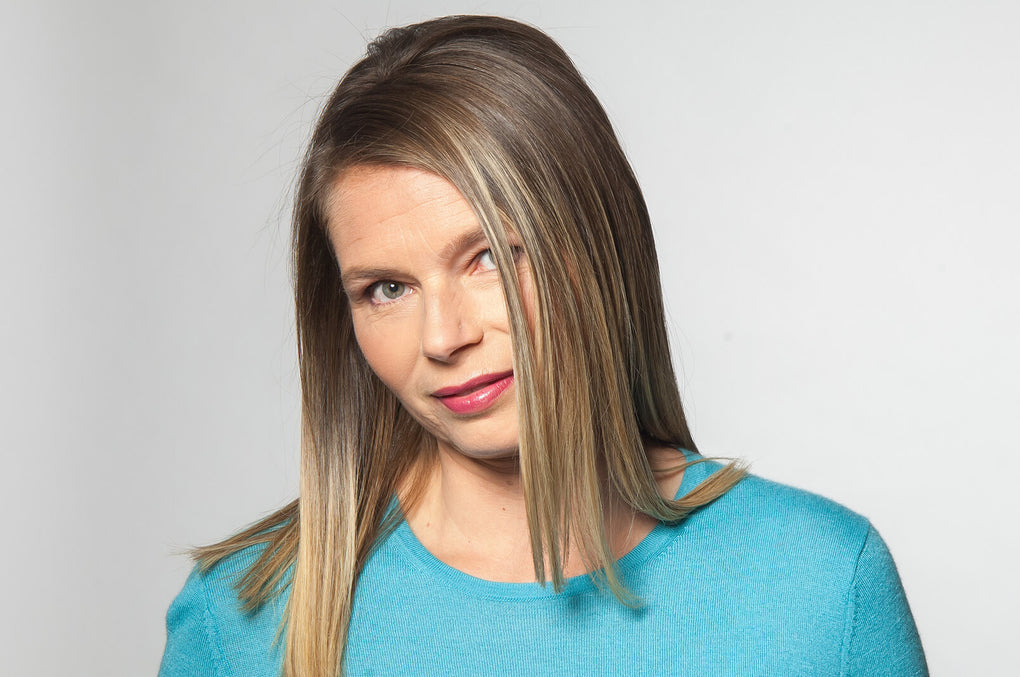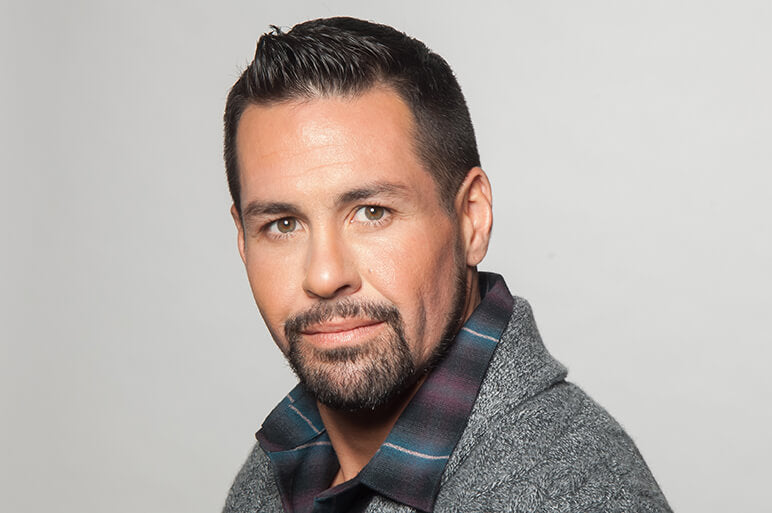-
The Scalp: The Source of Hair
Just as a tree grows from its nourishing soil, so too, your hair grows from its source: the scalp. When you nourish the scalp, your hair transforms.
Learn more about the scalp
-
Relief for the Scalp
We’ve discovered special algae and developed the technology to create a healing scalp treatment that soothes itchy and flaky symptoms of scalp inflammation, restoring your scalp to promote healthy hair.
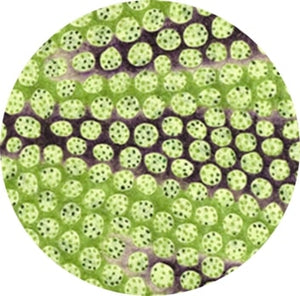
Stories
View all StoriesOur Blog

Can alopecia areata be cured? →

Can seborrheic dermatitis cause itchv ears? →

Can seborrheic dermatitis spread to ears? →

Can spots on scalp cause hair loss? →
Our Blog
View all blog posts-

Can alopecia areata be cured?
The short answer is: we don't know yet. Researchers are still trying to figure out exactly what causes alopecia areata, and until they do, there is no way to know for sure whether or not it can be cured. That said, there are treatments available that can help to promote hair growth and prevent further hair loss. So while there is no cure for alopecia areata at this time, there are ways to manage the condition and improve the quality of your life. If you or someone you know is dealing with alopecia areata, please know that you are not alone. There are many resources and support groups available to help you through this tough time. Alopecia areata is an autoimmune skin condition that causes hair loss. There is no cure for alopecia areata, but there are treatments that can help regrow hair. In some cases, the hair will grow back on its own. If you have alopecia areata, it is important to see a dermatologist to find the best treatment for you. Alopecia areata is a condition that causes hair loss. There is no cure for alopecia areata, but there are treatments that can help regrow hair. These treatments include corticosteroids, immunotherapy, and surgery. If you are experiencing hair loss, talk to your doctor about the best treatment option for you. There is no cure for alopecia areata, but there are treatments that can help regrow hair. The most common treatment is steroid injections, which help reduce inflammation and promote hair growth. In some cases, other medications may be used to treat alopecia areata. If you are experiencing hair loss, talk to your doctor about the best treatment options for you. There is no cure for alopecia areata, but there are treatments that can help regrow hair. The most common treatment is corticosteroid injections, which help reduce inflammation and promote hair growth. In some cases, doctors may also prescribe topical corticosteroids, minoxidil, or anthralin cream. These treatments can be effective, but they may need to be used for several months before results are seen. Alopecia areata is an autoimmune condition that causes patches of hair loss on the scalp and body. There is no cure for alopecia areata, but treatments are available to help hair grow back. The first line of treatment for alopecia areata is often corticosteroid injections or topical corticosteroids. These treatments can help hair regrow in some people. Other treatments that may be effective include: Minoxidil Anthralin Engergy-based therapies Some people with severe alopecia areata may choose to wear a wig or hairpiece. Wigs and hairpieces can provide immediate coverage for hair loss and can be a helpful treatment option.
-

Can seborrheic dermatitis cause itchv ears?
Seborrheic dermatitis is a skin condition that can cause symptoms like itchiness, redness, flakiness, and dandruff. While it can occur anywhere on the body, it is most common on the face, scalp, chest, and back. In some cases, seborrheic dermatitis can also affect the ears. Symptoms of seborrheic dermatitis on the ears may include itchiness, redness, flakiness, or dandruff. The condition can also cause the ears to produce more earwax than usual. If you experience any of these symptoms, you should see a doctor or dermatologist for treatment. There is no cure for seborrheic dermatitis, but there are treatments that can help to manage the symptoms. These include anti-inflammatory medications, corticosteroids, antifungals, dandruff shampoos, and light therapy. With treatment, most people with seborrheic dermatitis can achieve symptom relief.Seborrheic dermatitis is a chronic skin condition characterized by scaly, flaky skin. It can occur on the face, scalp, chest, and back. While it is not contagious, it can be uncomfortable and unsightly. In some cases, seborrheic dermatitis can also cause itchiness. If you have seborrheic dermatitis, you may be wondering if it can cause itchiness in your ears. The short answer is yes, seborrheic dermatitis can cause itchiness in your ears. This is because the skin around your ears is very sensitive and susceptible to irritation. When the skin is irritated, it can lead to itchiness. Seborrheic dermatitis can also cause the skin to become red and inflamed. If you notice these symptoms, you should see a doctor or dermatologist to treat the condition. There are a few things you can do to help relieve the itchiness caused by seborrheic dermatitis. One thing you can do is to use a mild shampoo or soap on your hair and scalp. This will help to remove any build-up of sebum, which can contribute to the development of seborrheic dermatitis. You should also avoid using harsh chemicals or detergents on your skin. If you must use them, be sure to rinse them off thoroughly afterwards. Another thing you can do is to apply a moisturizer to your skin after bathing. This will help to keep your skin hydrated and prevent the flaking and irritation associated with seborrheic dermatitis. You may also want to consider using a medicated cream or ointment prescribed by a doctor or dermatologist. These treatments can help to soothe the skin and reduce the symptoms of seborrheic dermatitis.
-

Can seborrheic dermatitis spread to ears?
Seborrheic dermatitis is a chronic skin condition that can spread to the ears. It causes redness, itchiness, and flaking of the skin. Seborrheic dermatitis is not contagious, but it can be uncomfortable and difficult to treat. There are many possible causes of seborrheic dermatitis, including genetics, hormonal changes, stress, and certain medical conditions. It is most common in people who have oily skin or who are overweight. Seborrheic dermatitis can be tricky to treat because it often comes back. A variety of treatments are available, including medicated shampoos, creams, and ointments. In severe cases, oral medications or light therapy may be necessary. If you have seborrheic dermatitis, be sure to see a doctor or dermatologist for proper treatment. With the right treatment, seborrheic dermatitis can be controlled and the symptoms can be managed. Seborrheic dermatitis is a common inflammatory skin condition that can affect any body area rich in oil glands, including the face, scalp, chest, and back. While the exact cause of seborrheic dermatitis is unknown, it's believed to be related to an overproduction of oil in the skin, which can worsen existing skin conditions like dandruff, psoriasis, and eczema. In general, seborrheic dermatitis isn't contagious and can't be spread from person to person. However, the condition can spread to other areas of your body, including your ears. In some cases, seborrheic dermatitis of the ears can lead to a condition called otitis externa, which is an inflammation of the ear canal. While seborrheic dermatitis itself isn't contagious, the condition can cause otitis externa, which is a form of ear infection that is contagious. If you have seborrheic dermatitis and notice that your symptoms are spreading to your ears, it's important to see a doctor so they can treat the condition and prevent it from spreading. Seborrheic dermatitis is a common, chronic skin condition that can cause scaly, itchy skin and redness. It most often affects the scalp, but it can also spread to the face, ears, chest, and back. In some cases, seborrheic dermatitis can also lead to hair loss. While the exact cause of seborrheic dermatitis is unknown, it is thought to be linked to an overproduction of oil in the sebaceous glands. This excess oil can then lead to the growth of yeast and bacteria on the skin, which can further irritate the skin and cause inflammation. Seborrheic dermatitis is also believed to be linked to hormones, stress, weather changes, and certain medical conditions. Although seborrheic dermatitis is not contagious, it can spread to other areas of the body. This is most likely to occur in people who have a weakened immune system or who are taking certain medications that can affect the skin. In most cases, seborrheic dermatitis can be treated with over-the-counter medications and home remedies.
-

Can spots on scalp cause hair loss?
Spots on the scalp are usually harmless and don't cause hair loss. However, if you have a medical condition that causes spots on your scalp, it could be a sign of a more serious problem. If you're concerned about spots on your scalp, see your doctor to rule out any underlying medical conditions. Spots on the scalp are usually no cause for alarm and are nothing to worry about. That said, in rare cases, spots on the scalp can be a sign of a more serious condition like skin cancer. If you have any concerns, it's always best to check with a doctor. Additionally, while not technically a "spot," dandruff can also lead to hair loss. Dandruff is a common condition that causes the skin on your scalp to peel and flake off. It's usually not harmful, but it can be annoying and it can also lead to hair loss. If you're concerned about spots on your scalp or hair loss, talk to your doctor. They can help you figure out what's causing the problem and how to treat it. scalp spots can cause hair follicle inflammation and infection, which may lead to hair loss. If you have any concerns about your scalp or hair loss, please consult a medical professional. It's a question that many people ask, but the answer isn't always straightforward. There are many potential causes of hair loss, and spots on the scalp can be one of them. Let's take a closer look at the potential link between scalp spots and hair loss. There are many different types of scalp spots, some of which can be caused by a variety of different things. For example, seborrheic dermatitis - a form of eczema - can cause yellow, scaly patches on the scalp. This can lead to hair loss if the patches are severe enough to damage the hair follicles. Other conditions that can cause scalp spots include psoriasis, ringworm, and even sunburn. None of these conditions are directly linked to hair loss, but they can all cause irritation and inflammation of the scalp, which can lead to hair fall out. In some cases, spots on the scalp can also be a sign of a more serious underlying health condition, such as leukemia or lupus. If you have any concerns about spots on your scalp, it's always best to speak to a doctor or dermatologist to get a diagnosis. So, can spots on the scalp cause hair loss? In short, yes - but it's important to remember that there are many potential causes of hair loss, and not all of them are related to scalp spots. If you're concerned about hair loss, it's always best to speak to a medical professional to get advice and treatment.
-
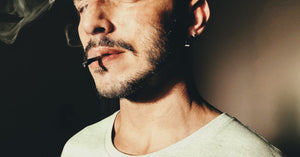
Can you recover from alopecia universalis?
If you have alopecia universalis, you've probably wondered if there's any way to recover from the condition. After all, it causes complete hair loss on the scalp and body. There is no cure for alopecia universalis, but there are ways to manage the condition and improve your quality of life. There are two main types of treatment for alopecia universalis: medical and surgical. Medical treatments can help slow down the hair loss process, but they don't always lead to regrowth. Surgical options, such as hair transplants, can be more effective in restoring hair, but they're also more invasive and expensive. The good news is that there are a number of options available to you, and with the right treatment plan, it is possible to experience significant hair regrowth. If you're ready to take action against your hair loss, talk to your doctor about the best course of treatment for you.Alopecia universalis is a condition that causes hair loss on the scalp and body. Universalis means " affects the entire body," and alopecia means "hair loss." Despite its name, alopecia universalis does not affect everyone with the condition. In fact, only about 5% of people with alopecia areata (the most common form of alopecia) will go on to develop universalis. There is no cure for alopecia universalis, but there are treatments that can help stop the hair loss and potentially regrow some hair. The first step in treatment is to visit a dermatologist to rule out other conditions that may be causing the hair loss. Once alopecia universalis has been diagnosed, the dermatologist will work with the patient to develop a treatment plan. There are two main types of treatment for alopecia universalis: medical and surgical. Medical treatments include topical corticosteroids, immunotherapy, and oral medications. These treatments can help stop the hair loss and potentially regrow some hair. Surgical treatment options for alopecia universalis include hair transplants and flap surgery. These procedures can be expensive and may not be covered by insurance. The best way to manage alopecia universalis is to find a dermatologist or other healthcare provider who is experienced in treating the condition. Early diagnosis and treatment is important for the best possible outcome. Can you recover from alopecia universalis? Alopecia universalis is a medical condition that causes a person to lose all of the hair on their body. The condition can be very difficult to deal with, both emotionally and physically. There is no cure for alopecia universalis, but there are treatments that can help improve the quality of life for those affected by the condition. One of the most difficult aspects of alopecia universalis is coming to terms with the fact that there is no cure. It can be difficult to accept that you will never have hair again, but it is important to remember that you are not alone. There are many people dealing with this condition, and there is support available. There are a number of treatments available that can help reduce the symptoms of alopecia universalis. These treatments can help improve quality of life, but they will not cure the condition. Some of the available treatments include: Topical corticosteroids: These medications can help reduce inflammation and itchiness. Immunotherapy: This therapy helps to decrease the immune system response that is causing the hair loss. Hairpieces: Hairpieces can be used to cover areas of hair loss. Wigs: Wigs can be used to cover all of the head or just areas of hair loss. They are available in human hair or synthetic materials. Alopecia universalis is a difficult condition to deal with, but you are not alone. There are treatments available that can help improve your quality of life. Seek out support from others who are dealing with this condition, and remember that you are not alone.
-
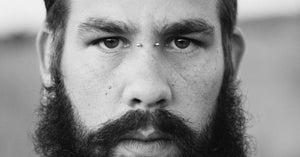
How can a black man grow back a bald spot?
There are a number of ways that a black man can grow back a bald spot. One way is to use a product called "Hairfinity." This product is designed to help with hair growth and health. It contains biotin, which is known to help with hair growth. Another way to help regrow a bald spot is to use a scalp massager. This can help stimulate blood flow to the area, which can promote hair growth. Finally, it is important to eat a healthy diet and get enough sleep. These things can help the body to be healthy and promote hair growth. Balding is a normal part of the aging process for many men. But for some black men, premature hair loss can be especially distressing. If you're noticing a bald spot on your head, don't panic! There are a number of ways you can treat it. First, it's important to understand that hair loss is not necessarily permanent. If you start treatment early, you may be able to stop the hair loss and even regrow new hair. There are a number of different treatments available, including: Minoxidil. This is a topical medication that is applied to the scalp twice a day. It works by increasing blood flow to the hair follicles and has been shown to be effective in promoting hair growth. Steroid injections. These are injected into the bald spot to help increase blood flow and stimulate hair growth. In addition to medical treatments, there are also a number of lifestyle changes you can make to help slow down hair loss or even regrow hair. These include: Eating a healthy diet. A diet rich in protein, iron, and omega-3 fatty acids can help promote healthy hair growth. Reducing stress levels. Stress can contribute to hair loss, so it's important to find ways to relax and de-stress. Avoiding hairstyles that pull on the hair. Tight ponytails, cornrows, and other hairstyles that pull on the hair can lead to traction alopecia, a type of hair loss caused by damage to the hair follicles. Limiting use of hot styling tools. Frequent use of blow dryers, curling irons, and flat irons can damage the hair and lead to hair loss. If you're concerned about a bald spot, talk to your doctor. They can help you determine the underlying cause of your hair loss and recommend the best treatment options for you.





